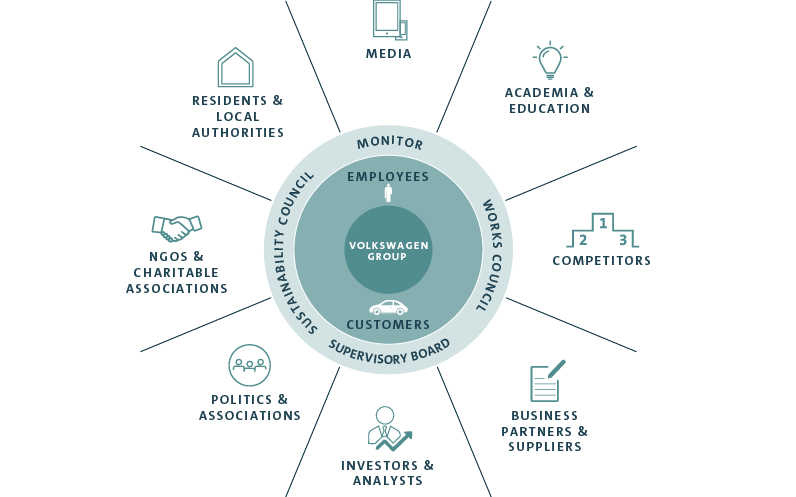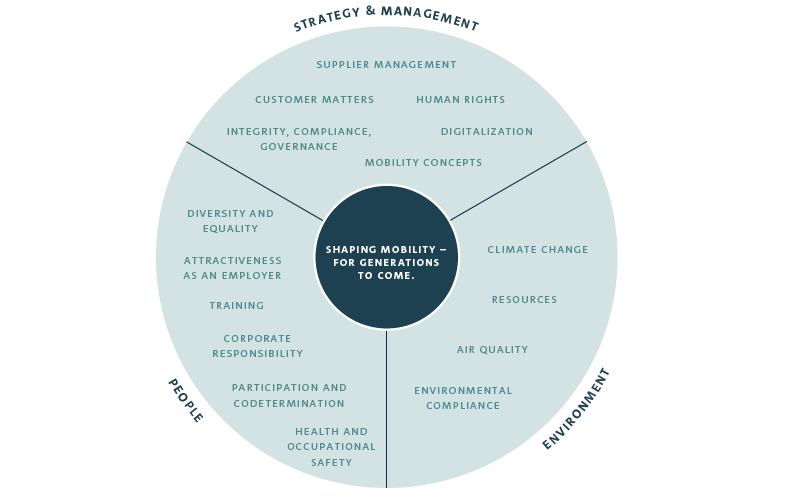Sustainability
For us, sustainability means simultaneously striving for economic, social and environmental goals in a way that gives them equal priority. As one of the largest industrial companies, we wish to put our creative powers to good use worldwide for the benefit of people and the environment. We have thus developed a sustainable style of company management and put in place the necessary management structures.
We have anchored our goal to sustainably shape mobility for present and future generations in our Group strategy TOGETHER 2025+. In addition, we want to be an excellent employer and a role model for the environment, safety and integrity. Sustainability is thus at the center of our corporate actions.
A particular challenge when implementing our strategic goals on all levels of the value chain is the complexity of our Company, with its twelve brands, more than 670 thousand employees and 124 production sites. At the same time, we are guiding our Group through the furthest-reaching process of change in its history. The transformation sweeping our entire industry is dominated especially by the transition to e-mobility, digitalization and new mobility services. We want to master these challenges and become a leading company for individual mobility in this electric and connected age.
Protecting the climate is currently the greatest global challenge affecting all three sustainability dimensions. We want to provide our own highly unique answer to this and have decided on an ambitious decarbonization program. With the implementation of this program we want to be a carbon-neutral company by 2050. We are assuming a pioneering role by making this voluntary commitment based on the Paris Climate Agreement. To this end, we are guided by the specifications of the Task Force on Climate-Related Financial Disclosures (TCFD); for more information, please see our Sustainability Report for fiscal year 2019.
In the field of digitalization we also want to help shape the transformation and are pressing ahead with developments in our vehicles and mobility services on the one hand and in our operating processes and management on the other. The digital transformation requires us not just to develop new technologies and be able to harness them, but also to come up with a forward-looking human resources strategy that takes our employees along this path of change and ensures that they are trained and that their jobs are secured.
Parameters and guiding principles
Our actions are determined by the Volkswagen Group Essentials as the foundation of values and the basis for our shared corporate culture. The Volkswagen Group Essentials support managers and employees in overcoming legal and ethical challenges that arise in their daily work. At the same time, we are guided in our activities by a large number of internal guidelines on sustainability. These include the Volkswagen Social Charter, the Charter on Labor Relations, the Charter on Vocational Education and Training, and the Charter on Temporary Work.
On this basis, our objective is to ensure that the Volkswagen Group’s actions are in line with international agreements and frameworks such as the Sustainable Development Goals (SDGs) of the United Nations (UN), the declarations of the International Labor Organization (ILO), the principles and conventions of the Organization for Economic Co-operation and Development (OECD) and the UN covenants on basic rights and freedoms.
We have developed our own guiding principles for the different aspects of sustainability in conjunction with the so called mission statements. These pithy, focused statements underscore our goals, programs and measures. In this context, we created the Group’s new “goTOzero” environmental mission statement in 2019 which represents our goal to achieve net carbon neutrality with a business approach that is as environmentally friendly as possible. In the implementation of its environmental mission statement, Volkswagen is primarily focusing on the four areas of climate change, resources, air quality and environmental compliance.
We take a similar approach in the area of social sustainability, where we aspire to act responsibly and fairly to all stakeholders as a good corporate citizen. Within the Company, the cornerstones of this mission statement are the characteristics of an attractive employer such as employee profit participation plans, job security, career development opportunities and equal opportunities. Externally, we seek dialog with society, initiate and support social projects and encourage our staff to take responsibility for the community.
Management and coordination
The structure and workflows of core processes in Group-wide sustainability management were refined in the reporting period. The related specifications, structures and processes will subsequently be codified in a separate Group policy. The core elements include assumption of overall responsibility for sustainability by the Chairman of the Board of Management of Volkswagen AG, specification of the competence of the responsible Board members for specific sustainability management concepts and development of rules of procedure by the Group Sustainability Steering Committee. The members of this steering committee include managers from central Board of Management business areas and representatives of the brands and the Group Works Council. The steering committee defines concrete strategic goals and programs, establishes measures for uniform further development of sustainability management across divisions, brands and regions and decides on fundamental sustainability issues. It also handles the enhancement of Group-wide sustainability management. The offices of the Group Sustainability Steering Committee are part of the Group’s Sustainability function.
Strategic stakeholder management
Our stakeholders are individuals, groups, or organizations who have a material influence on or are materially influenced by the course or the result of corporate decisions. Our customers and employees are at the center of our stakeholder network. Based on our annual stakeholder assessment we have identified eight more external stakeholder groups of equal value around this core. The Group’s supervisory and advisory bodies such as the Supervisory Board and the Works Council, the Sustainability Council and the Monitor appointed by the US Department of Justice, act as a special interface between internal and external stakeholders.
We understand stakeholder management as systematic, continuous interaction with key stakeholder groups in line with our TOGETHER 2025+ Group strategy. Stakeholder management aims to systematically record expectations and use feedback from our stakeholders to critically reflect on strategic planning processes.
To be able to systematically incorporate our stakeholders’ suggestions and recommendations, we have given our stakeholder management an organizational structure in the form of external committees. At Group level these are the Sustainability Council and the Stakeholder Panel. The Panel is comprised of 300 national and international opinion leaders. In addition, we offer our stakeholders a broad range of opportunities for interaction and feedback channels including regular discussion panels with stakeholders, stakeholder surveys and international cooperative projects.
THE VOLKSWAGEN GROUP’S STAKEHOLDERS

Sustainability Council
The Volkswagen Group appointed a Sustainability Council in September 2016, initially for the period until 2020, to provide assistance with sustainability issues. This is made up of internationally renowned experts from the academic world, politics and society. The Council establishes its own working methods and areas of focus independently, has far-reaching rights for the purposes of exchanging information, consultation and initiating action, and consults regularly with the Board of Management, top management and the employee representatives.
The projects initiated in 2018 started to deliver results in 2019:
- The Open Source Lab on Sustainable Mobility organized, among other things, dialog events on the use of open data in the field of mobility and drew up position papers on this topic.
- The international program for forecast-based civil protection financing implemented initial mechanisms.
- The research project on traffic policy instruments for reaching international climate targets published initial brief studies.
- Visiting professors at the open labs began their work.
- The project for the strategic focus of sustainability at Volkswagen reached its first milestones.
In addition, the Council decided on three new initiatives: a research project on distribution effects and acceptance of climate-friendly fiscal policy, a study on the effects of digitalization and e-mobility on employment, and a commitment to a sustainable cobalt supply chain. Furthermore, the Sustainability Council formulated further recommendations for how technological, political and cultural change should be organized to win back trust and lay the foundations for future success.
THE VOLKSWAGEN GROUP’S KEY ACTION AREAS

Materiality analysis
The development of our new corporate vision “Shaping mobility – for generations to come” in 2019 played a key role in identifying the topics that are material for the Volkswagen Group. We seek to provide answers to the challenges of today and tomorrow with our enhanced Group strategy TOGETHER 2025+. Our goal is to make mobility sustainable for our own and for future generations. With electric drives, digital connectivity and autonomous driving, we want to make the automobile cleaner, quieter, more intelligent and safer.
As the starting point for our materiality analysis, we are oriented towards the SDGs formulated by the United Nations, which describe the social challenges facing companies. Based on the results of the analysis we conducted in the reporting year, we have defined 16 key action areas. Key action areas were revised, restructured and grouped together in the fiscal year. In order to identify key topics, we took into account external studies, sector and media analyses, ratings, stakeholder surveys, internal and external guidelines and codes, the TOGETHER 2025+ Group strategy and the individual departmental strategies.
As the details of our Group strategy have not yet been finalized, we are still in the process of specifying the content of the key action areas based on values, targets and KPIs.
Corporate citizenship
As a good corporate citizen, we aim to be a constant source of economic impetus for local structural development and equal opportunities. We have always believed in the importance of recognizing our social responsibilities toward our stakeholders. The main focus of our corporate social engagement activities is on supporting future, educational and community projects at many of our sites across the world. In 2019, the brands and companies launched or continued over 520 projects and initiatives worldwide.